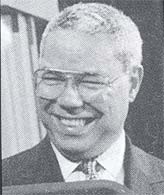

Colin Powell, one of the men who conducted the first nonpartisan Presidents' Summit for America's Future. With the help of the President, Mrs. Clinton, and all living former presidents.(with the exception of Ronald Reagan, who was represented by his wife, Nancy), Powell highlighted the reality that too many Americans are unaware that giving through volunteerism and community service can make a real difference in the lives of their fellow citizens.
The Summit helped to launch America's Promise: The Alliance for Youth, which is an attempt to save two million children-poor and often dys functional (News Week, April 28, 1997). The goal for the Summit is to mobilize corporate America and an extensive volunteer army to rescue at-risk youths through tutoring, mentoring, and other projects that will bring caring adults directly into their lives.
In the past, presidents have had varying degrees of success in building interest in volunteerism. The Peace Corps and VISTA were initiatives of Presidents Kennedy and Johnson, respectively, during the 1960s. President Bush gave us a thousand points of light during his term in office, and more recently, President Clinton launched AmeriCorps during his first term.
Will the Summit and Powell's leadership make a difference? To date, at least 150 corporations have pledged time and funds to the Presidents' Summit for America's Future. For example:
The politicians, CEO's, and charity chiefs who were beckoned to the Summit remain hopeful that this partllership will open a whole new chapter in American social history. Millions of people will be directly asked, for the first time, to volunteer-will they? Research shows that when properly summoned, Americans will serve (News Week, April 28 1997).
However, what also must be asked is whether the Summit is a national plan that will have staying power? Or will it begin to fizzle once the media turn their attention to another issue? The fact is that most companies are in business to make a profit, not to do community service. "Phrases like compulsory volunteers and paid volunteers are both oxymoric and disquieting" (USA Today, May 2, 1997). Shouldn't community service come from the heart and, by its very nature, be voluntary-no strings attached?
Wouldn't it be more realistic and pragmatic to focus on community service and volunteerism development via our educational system? John DiBiaggio, President of Tufts University, believes that "it is the role of all educators, particularly those in higher education, to harness the idealism and fervor that happens only when we are eighteen and ensure that it finds channels for expression that will last a lifetime and change lives" (The Boston Globe, May 2, 1997).
Furthermore, Benjamin Barber in his 1992 book, An Aristocracy of Everyone, indicates the necessity of acquiring skills that will serve as the foundation for volunteerism. "The literacy required to live in a civil society, the competence to participate in democratic communities, the ability to think critically and act deliberately in a pluralistic world, the empathy that pennits us to hear and thus accommodate others, all involve skills that must be acquired." What better place than schools, colleges, and universities to teach such skills?
Some high schools, colleges, and universities across the country are already making community service learning programs available to students. Community service education is a powerful tool. for nurturing civic responsibility. It can transfonn students from passive recipients to active providers. In doing so, it can redefine the perception of youth as a cause of problems to a source of solutions (Community Service Learning Center, Springfield, MA, April 30, 1993).
The mission of those who teach in higher education has traditionil1ly been the development of knowledge and competence in students to ensure their transition to successful careers. One could also argue the importance of civic education at the college level-to mentor students for the crucial roles of volunteer and civil servant. What mentoring opportunities are made available on your campus so students will ultimately take their rightful places in society-not only as professionals, but as contributing members, as well?